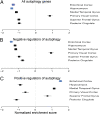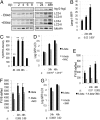Genome-wide analysis reveals mechanisms modulating autophagy in normal brain aging and in Alzheimer's disease
- PMID: 20660724
- PMCID: PMC2922576
- DOI: 10.1073/pnas.1009485107
Genome-wide analysis reveals mechanisms modulating autophagy in normal brain aging and in Alzheimer's disease
Abstract
Dysregulation of autophagy, a cellular catabolic mechanism essential for degradation of misfolded proteins, has been implicated in multiple neurodegenerative diseases. However, the mechanisms that lead to the autophagy dysfunction are still not clear. Based on the results of a genome-wide screen, we show that reactive oxygen species (ROS) serve as common mediators upstream of the activation of the type III PI3 kinase, which is critical for the initiation of autophagy. Furthermore, ROS play an essential function in the induction of the type III PI3 kinase and autophagy in response to amyloid beta peptide, the main pathogenic mediator of Alzheimer's disease (AD). However, lysosomal blockage also caused by Abeta is independent of ROS. In addition, we demonstrate that autophagy is transcriptionally down-regulated during normal aging in the human brain. Strikingly, in contrast to normal aging, we observe transcriptional up-regulation of autophagy in the brains of AD patients, suggesting that there might be a compensatory regulation of autophagy. Interestingly, we show that an AD drug and an AD drug candidate have inhibitory effects on autophagy, raising the possibility that decreasing input into the lysosomal system may help to reduce cellular stress in AD. Finally, we provide a list of candidate drug targets that can be used to safely modulate levels of autophagy without causing cell death.
Conflict of interest statement
The authors declare no conflict of interest.
Figures






References
-
- Levine B, Klionsky DJ. Development by self-digestion: Molecular mechanisms and biological functions of autophagy. Dev Cell. 2004;6:463–477. - PubMed
-
- Hara T, et al. Suppression of basal autophagy in neural cells causes neurodegenerative disease in mice. Nature. 2006;441:885–889. - PubMed
-
- Ravikumar B, et al. Inhibition of mTOR induces autophagy and reduces toxicity of polyglutamine expansions in fly and mouse models of Huntington disease. Nat Genet. 2004;36:585–595. - PubMed
-
- Nixon RA, et al. Extensive involvement of autophagy in Alzheimer disease: An immuno-electron microscopy study. J Neuropathol Exp Neurol. 2005;64:113–122. - PubMed
Publication types
MeSH terms
Substances
Grants and funding
LinkOut - more resources
Full Text Sources
Other Literature Sources
Medical

